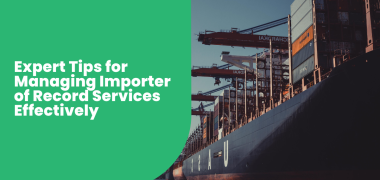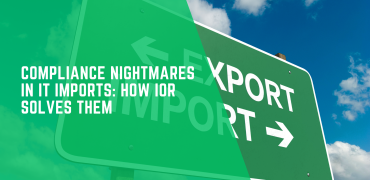Managing Importer of Record (IOR) services is a critical aspect of international trade that can significantly impact a business’s supply chain efficiency, regulatory compliance, and overall operational effectiveness. As global trade continues to expand, businesses must navigate complex customs regulations, ensure timely delivery of goods, and minimize costs. In this blog post, we will provide expert tips for managing IOR services effectively, covering key strategies for selecting the right IOR provider, optimizing customs processes, and staying compliant with evolving regulations.
Understanding Importer of Record Services
What is an Importer of Record?
An Importer of Record (IOR) is a designated person or entity responsible for ensuring that imported goods comply with all applicable laws and regulations of the destination country. The IOR handles documentation, pays duties and taxes, and ensures the legal entry of goods into the country. This role is essential for businesses engaged in international trade, as it ensures smooth customs clearance and compliance with local laws.
Key Responsibilities of an IOR
- Customs Compliance: Ensuring that all imports meet regulatory standards.
- Documentation: Managing necessary paperwork, including licenses, permits, and certificates.
- Payment of Duties and Taxes: Calculating and paying applicable fees.
- Record Keeping: Maintaining detailed records for audit purposes.
Tips for Selecting the Right IOR Service Provider
Choosing the right IOR service provider is crucial for the success of your import operations. Here are some tips to help you make an informed decision:
1. Evaluate Industry Expertise
Select an IOR service provider with extensive experience in your industry. Industry-specific knowledge ensures that the provider understands the unique regulatory requirements and challenges associated with your products.
Benefits:
- Specialized Knowledge: Providers with industry expertise can navigate complex regulations more effectively.
- Tailored Solutions: Customized services that address the specific needs of your business.
2. Assess Geographic Coverage
Ensure that the IOR service provider has a strong presence in the countries where you conduct business. Geographic coverage is essential for managing imports smoothly across different regions.
Benefits:
- Local Expertise: Providers with a local presence are more familiar with regional regulations and customs procedures.
- Streamlined Operations: Efficient handling of imports in multiple locations.
3. Check Compliance Record
Review the provider’s history of compliance and any past issues. A strong compliance record indicates that the provider is reliable and capable of managing imports without legal complications.
Benefits:
- Risk Mitigation: Reduced likelihood of compliance-related issues.
- Peace of Mind: Confidence in the provider’s ability to handle imports legally.
4. Consider Cost and Value
While cost is an important factor, it should not be the sole criterion. Evaluate the overall value provided by the IOR service, including the quality of service, expertise, and additional benefits.
Benefits:
- Value for Money: Balancing cost with service quality ensures a better return on investment.
- Comprehensive Services: Access to a range of services that enhance import operations.
5. Look for Technology Integration
Choose a provider that leverages advanced technology to enhance efficiency and visibility. Tools like real-time tracking, automated documentation, and data analytics can significantly improve import management.
Benefits:
- Enhanced Visibility: Real-time tracking and reporting provide insights into the status of shipments.
- Efficiency Gains: Automation reduces manual errors and speeds up processes.
Strategies for Optimizing Customs Processes
Effective management of customs processes is crucial for ensuring timely delivery and minimizing delays. Here are some strategies to optimize customs procedures:
1. Prepare Accurate Documentation
Accurate and complete documentation is essential for smooth customs clearance. Ensure that all necessary paperwork, including invoices, packing lists, and certificates, is correctly filled out and submitted on time.
Benefits:
- Faster Clearance: Accurate documentation reduces the risk of delays and rejections.
- Compliance Assurance: Meeting documentation requirements ensures compliance with customs regulations.
2. Classify Goods Correctly
Proper classification of goods according to the Harmonized System (HS) codes is crucial for determining duties and taxes. Misclassification can lead to incorrect duty payments and potential legal issues.
Benefits:
- Correct Duty Payments: Accurate classification ensures that duties and taxes are correctly calculated.
- Avoidance of Penalties: Proper classification reduces the risk of fines for incorrect duty payments.
3. Leverage Pre-Clearance Programs
Participate in pre-clearance programs offered by customs authorities. These programs expedite the clearance process by allowing pre-approved importers to benefit from faster processing times.
Benefits:
- Reduced Lead Times: Faster processing of shipments leads to shorter lead times.
- Enhanced Reliability: Participation in trusted programs enhances the reliability of import operations.
4. Maintain Communication with Customs Authorities
Establish and maintain good communication with customs authorities. Promptly address any issues or inquiries from customs officials to avoid delays and ensure smooth operations.
Benefits:
- Proactive Issue Resolution: Timely communication helps resolve issues before they escalate.
- Positive Relationships: Building good relationships with customs authorities can lead to more favorable treatment.
5. Implement Internal Audits
Regularly conduct internal audits of your import processes to identify and address potential compliance issues. Audits help ensure that your import operations adhere to all relevant regulations and standards.
Benefits:
- Continuous Improvement: Identifying areas for improvement leads to more efficient processes.
- Compliance Assurance: Regular audits ensure ongoing compliance with regulations.
Staying Compliant with Evolving Regulations
International trade regulations are constantly evolving, and staying compliant is essential for avoiding legal issues and penalties. Here are some tips for managing compliance effectively:
1. Stay Informed About Regulatory Changes
Regularly monitor updates to international trade regulations. Subscribe to industry newsletters, attend webinars, and participate in trade associations to stay informed about changes that may affect your import operations.
Benefits:
- Timely Updates: Staying informed ensures that you can promptly adapt to regulatory changes.
- Proactive Compliance: Being aware of changes helps you proactively adjust your processes to maintain compliance.
2. Invest in Training and Education
Provide ongoing training and education for your team to ensure they understand the importance of compliance and are aware of the latest regulations. Training programs should cover key areas such as documentation, classification, and customs procedures.
Benefits:
- Knowledgeable Team: A well-trained team is better equipped to handle compliance-related tasks.
- Reduced Risk: Ongoing education reduces the risk of non-compliance due to lack of knowledge.
3. Work with Compliance Experts
Collaborate with compliance experts, such as customs brokers and legal advisors, to ensure that your import operations meet all regulatory requirements. Experts can provide valuable guidance and help you navigate complex regulations.
Benefits:
- Expert Guidance: Access to expert advice ensures that your import operations are compliant.
- Risk Mitigation: Working with experts reduces the risk of compliance-related issues.
4. Implement Compliance Monitoring Tools
Utilize compliance monitoring tools to track and manage your import operations. These tools can help you identify potential compliance issues, monitor regulatory changes, and ensure that all import activities adhere to the latest standards.
Benefits:
- Real-Time Monitoring: Compliance tools provide real-time insights into your import operations.
- Proactive Management: Identifying issues early allows for proactive management and resolution.
5. Document Compliance Procedures
Develop and document detailed compliance procedures for your import operations. Clear and comprehensive procedures ensure that your team understands the steps required to maintain compliance.
Benefits:
- Standardized Processes: Documented procedures ensure consistency in compliance-related tasks.
- Training Resource: Procedures serve as a valuable resource for training new team members.
Future Trends in Importer of Record Services
As the global trade landscape continues to evolve, IOR services will adapt to meet new challenges and opportunities. Here are some future trends to watch for in the management of IOR services:
1. Increased Automation and AI Integration
Automation and artificial intelligence (AI) will play a significant role in the future of IOR services. Automated systems can handle repetitive tasks, such as documentation and classification, while AI can provide predictive analytics to optimize import operations.
Benefits:
- Efficiency Gains: Automation reduces manual errors and speeds up processes.
- Data-Driven Insights: AI provides valuable insights for decision-making and optimization.
2. Blockchain for Secure Documentation
Blockchain technology offers a secure and transparent way to manage import documentation. By creating an immutable record of transactions, blockchain can enhance the security and traceability of import processes.
Benefits:
- Enhanced Security: Blockchain ensures that documentation is secure and tamper-proof.
- Transparency: Transparent records improve trust and accountability in the supply chain.
3. Focus on Sustainability and Ethical Sourcing
Sustainability and ethical sourcing will become increasingly important in global trade. IOR service providers will need to ensure that imported goods meet environmental and ethical standards, aligning with the growing demand for sustainable practices.
Benefits:
- Sustainable Practices: Ensuring that imports adhere to environmental regulations and ethical sourcing standards.
- Corporate Responsibility: Aligning import practices with broader corporate social responsibility (CSR) goals.
4. Enhanced Supply Chain Visibility
Advanced tracking and reporting tools will continue to improve supply chain visibility. Real-time tracking, predictive analytics, and detailed reporting will enable businesses to monitor the status of their imports and make informed decisions.
Benefits:
- Improved Tracking: Real-time insights into shipment status enhance visibility.
- Informed Decisions: Access to detailed reports and analytics supports better decision-making.
Conclusion
Effective management of Importer of Record (IOR) services is essential for the success of international trade operations. By selecting the right IOR service provider, optimizing customs processes, and staying compliant with evolving regulations, businesses can enhance supply chain efficiency, reduce risks, and achieve long-term success. As technology continues to advance and sustainability becomes a key focus, the role of IOR services will only become more critical. By implementing the expert tips outlined in this blog post, businesses can navigate the complexities of global trade and ensure the smooth and compliant import of goods into their destination countries.
In summary, the key to managing IOR services effectively lies in a combination of industry expertise, technological integration, proactive compliance management, and a commitment to sustainability. By staying informed about regulatory changes, investing in training and education, and leveraging advanced tools, businesses can optimize their import operations and drive growth in the competitive world of international trade.




